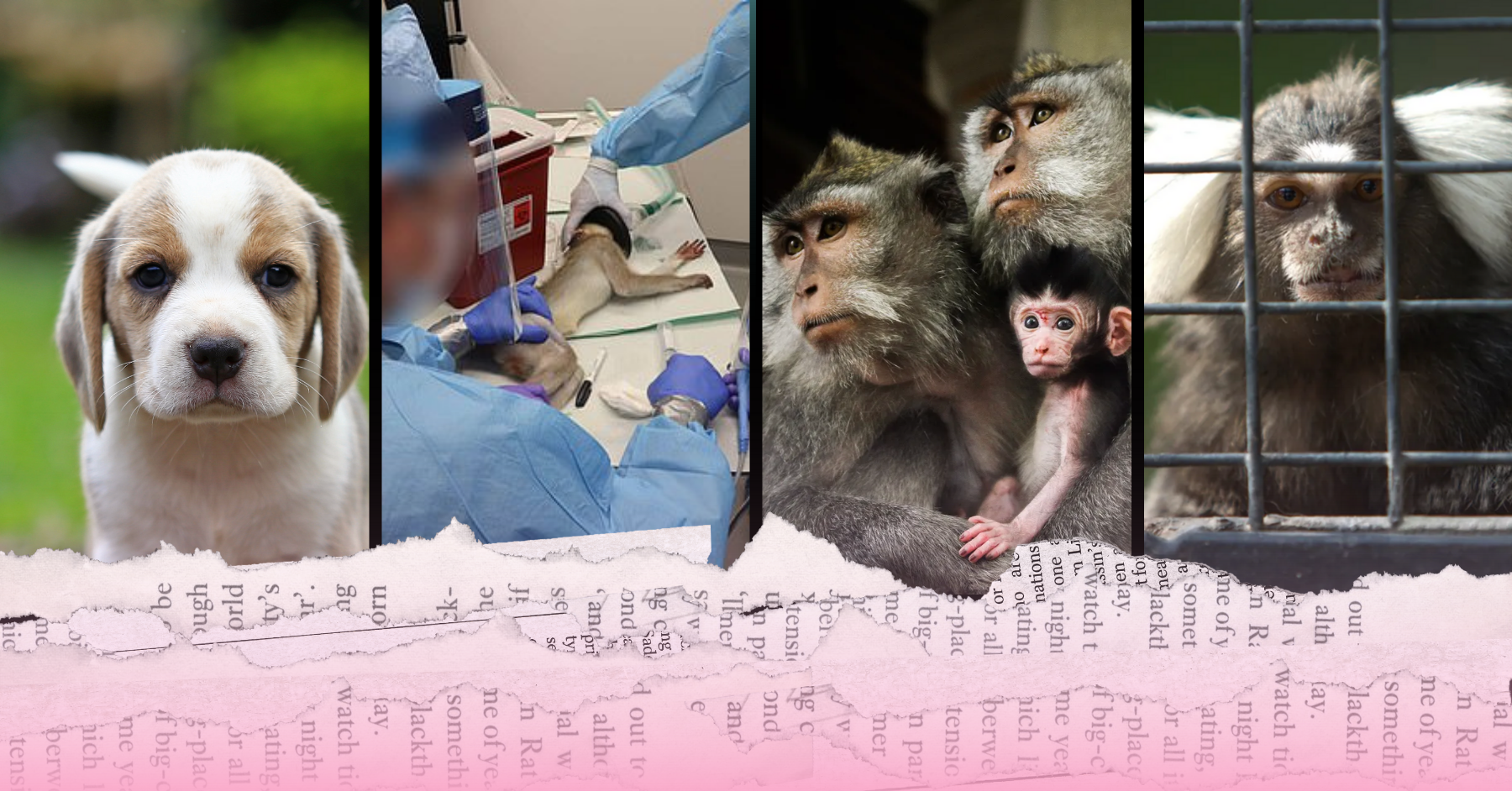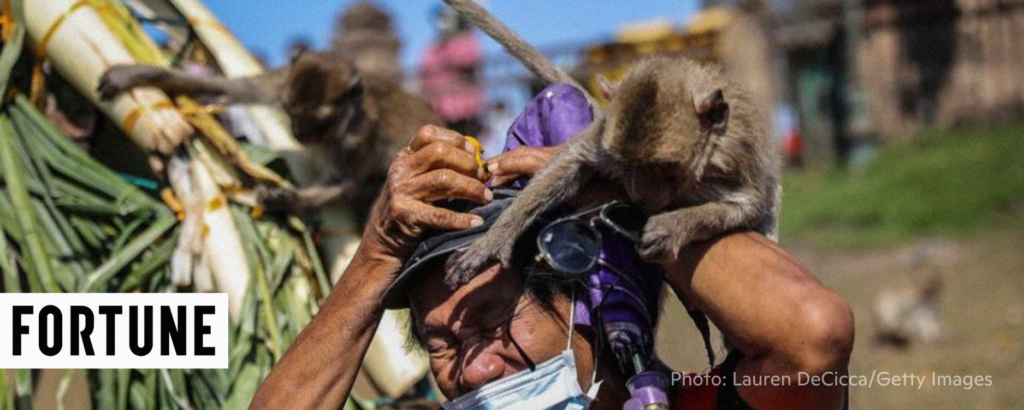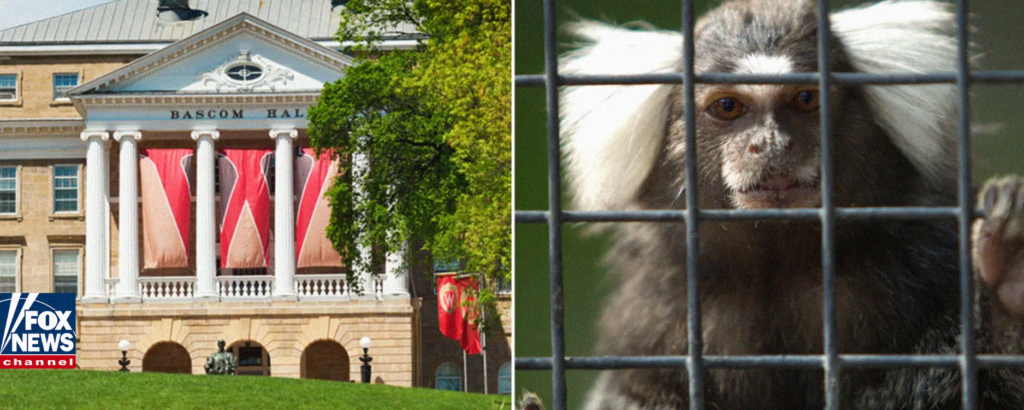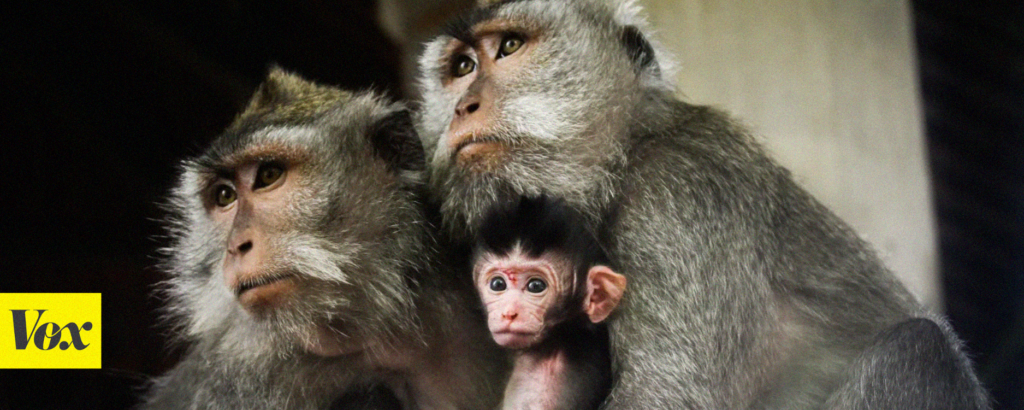
Here’s a roundup of this week’s biggest news stories related to animal research—all the recent media coverage you need to know right now to be the most effective activist for animals in labs.

Is Big Pharma’s Favorite Lab Monkey Endangered?
Erika Fry, 1/27/2024
“If governments or global wildlife regulators ban or highly restrict the [long-tailed macaques’] trade, that could end the use of long-tailed macaques in research altogether – an alarming possibility for the $586 billion U.S. biopharmaceutical industry….”
“. . . in a shock to the drug development industry that relies upon the species to test a least 20% of new drugs . . . an influential wildlife organization classified the long-tailed macaque as endangered in 2022 . . . and it pointed to the illegal trade fueled by science’s enormous use of lab animals, declaring: ‘The demand for non-human primates in research is threatening the species.’”
“With its pipeline of lab monkeys at stake, the industry has been quick to dispute the IUCN’s assessment . . . industry representatives rarely seem to consider the possibility that the long-tailed macaque is endangered.” 📰 Full Story →

Utah Residents Must Act to Defend Animals and Democracy
Rise for Animals, 2/1/2024
Is a sentient animal just an inanimate object? Like us at Rise for Animals, your answer is probably “Absolutely not!” — but Utah’s legislature is currently considering otherwise.
A Utah bill (H.B. 249) that has moved swiftly through the state’s House and into its Senate aims to classify living, breathing animals as “mere things”, equating them with “artificial intelligence”, “inanimate object[s]”, “bod[ies] of water”, “atmospheric gases” [sic], and “weather”.
This bill dangerously aims to prevent the state government at any level, and including the courts, from granting legal personhood to nonhuman animals. Though legal personhood may not be necessary for animals to be given rights, Utah’s bill plainly seeks to forestall any recognition of such rights by further codifying animals’ status as objects. Even if you’re not a Utah resident, you’re going to want to read this: 📰 Full Story →

PETA Pleads with NIH to Stop Funding for Animal Study, Calls Sleep Experiment ‘Cruel and Horrific’
Melissa Rudy, 1/26/2024
“The study, intended to gather information about age-related cognitive decline, involves disrupting the sleep of aged marmosets, which are small, long-tailed South American monkeys.”
“‘PETA has obtained documents showing that [a research team] is going to be waking the monkeys every 15 minutes all night long by blaring loud noise at them,’….”
“‘Keeping a monkey from sleeping – considered a form of torture in humans that can ultimately result in death – won’t mimic insomnia in people,’….” 📰 Full Story →

Controversial Dog Rescue in Wisconsin Reveals Cruel UI Experiments
Illir Sulejmani, 1/31/2024
“In 2017, activities from the animal rights group Direct Action Everywhere entered a dog breeding facility in Dane County, Wisconsin, called Ridglan Farms. Ridglan sells beagles to animal experiments, usually universities . . . As they entered, they discovered dogs confined one or two per cage, trapped with their own feces and urine. Their paws were red and swollen from constantly standing on cage floors made of plastic-coated metal wire. Many were spinning frantically – behavior resulting from severe psychological anguish.”
“The activists rescued three dogs: Julie, Anna and Lucy. Today, they enjoy going on walks, playing in the park and snacking on peanut butter, just like the pets many of us have at home. The others left behind were not so lucky.”
“The activists were trying to save these dogs from violence. In March, they will face felony burglary and theft charges for their rescues. In multiple instances both before and after the rescues, the [USDA] cited Ridglan for violations of the Animal welfare Act . . . Yet, the USDA declined to penalize Ridglan.”
“We should ask ourselves what it means that the people who rescued the animal victims are on trial while the breeders and researchers abusing and killing them are let off with warnings at worst.” 📰 Full Story →

Inside NIH Virus Lab In Montana – That Has Eerie Ties to Wuhan – Where US Scientists Inject Pigs and Monkeys with EBOLA and Other Dangerous Bio-Agents
Alexa Lardieri, 1/27/2024
“Photos and videos obtained exclusively by DailyMail.com show US government-funded researchers experimenting on animals at a controversial lab in Montana where risky virus research is carried out” and “show researchers sedating monkeys and pigs and giving them injections, as well as piglets housed in small and unsanitary cages.”
Current projects “include injecting pigs with Ebola and infecting monkeys with Covid-19 and studying how they react to Hemorrhagic Fever, which involves vomiting blood, internal bleeding, bleeding in the brain and from the eyes, nose and mouth.” 📰 Full Story →

The US Uses Endangered Monkeys to Test Drugs. This Law Could Free Them.
Dayton Martindale, 1/31/2024
“Tanya Sanerib has some advice for your next life: ‘Don’t come back as a crab-eating macaque.’”
“In recent years, exporters based largely in their native range of Southeast Asia have sold more than 30,000 long-tailed macaques annually to the US, largely for laboratory use . . . Throughout the 2010s, 60 percent of the more than 400,000 long-tailed macaques exported from Asia went to the US.”
“ . . . an [Endangered Species Act’ listing for the long-tailed macaque could transform the species’ use in US labs. Without external pressure, however, the Fish and Wildlife Service is unlikely to announce protections for the long-tailed macaque any time soon” because “‘the ESA is perpetually bogged down by politics.’” 📰 Full Story →
 The Malignancy in Cancer Research
The Malignancy in Cancer Research
Rise for Animals, 2/2/2024
Ahead of World Cancer Day (Feb. 4), we’re presenting you with a throughly researched deep-dive into the problems with cancer research as it exists in an animal-research-dominated industry. The biggest problem? Cancer research has been prioritized over the last 50 years, yet it has not contributed to either a just or a cancer-free world.
In truth, even though “[m]ore animals have been sacrificed to find a cure for cancer than for any other disease”, “cancer has been on the increase for half a century.” And while human disease models have already achieved major advances in the fight against cancer, they remain woefully underfunded (and thus underutilized) in today’s cancer research arena.
Animal research is consistently failing to translate into improved human health. The tremendous “physiological differences between human and animal cancers” result in “erroneous conclusions” that “delay[] the discovery of solutions”. 📰 Full Story →